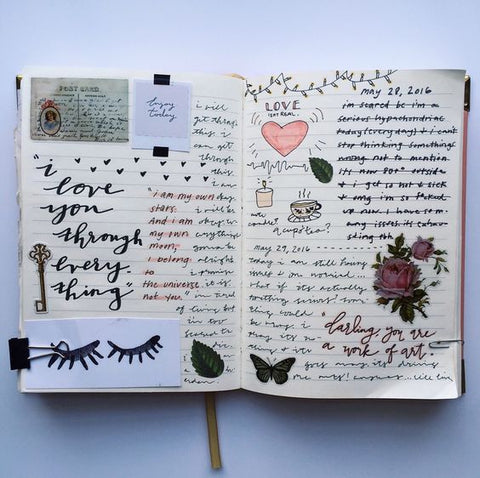Free Worldwide Delivery
Collect In Store Monday-Friday
Simple no quibble returns policy
How to write an Interesting Diary
Posted by Casey Tucker on
If you're like us, after a few weeks keeping a diary can become a chore rather than a pleasure. Recounting what you did in the day becomes tedious and you can quickly lose your love for writing. We wanted to look at ways to keep your diary exciting and make writing in it an activity that you want to do.
From different diary formats to prompts there's loads of ideas out there on how to create a diary that you love writing and which is still interesting to re-read in the coming years.
#1 Use Prompts

Often it's hard to start a diary. We tend to revert back to describing our day, and so keeping a diary becomes monotonous and tiresome. Prompts such as 'The most fun I've ever had was when...' or 'What are you looking forward to the most?' trigger memories and ideas that you may not have thought to include in your daily diary entry.
Look at websites such as The Huffington Post or Creative Writing Now for ideas of the kinds of prompts and then choose which ones you want to write about.
If you decide that you want to make prompts a part of your everyday writing routine you could always create a journal jar to store your ideas. Simply write some of your favourite prompts on bits of paper and put them in a jar to keep close to your journal. Then each night pick out a piece of paper and write your entry for the day using that prompt.
#2 Send a letter instead

Instead of creating a diary that only you are allowed to reflect on why not send letters?
Your writing instantly becomes more interactive and interesting if you correspond with friends and family that you may not get the chance to talk to regularly about your day.
If you're not too sure about writing a journal that you want other people to read then when not use the letter format to write letters you wish you could send, or want to send to your future self, in your diary. Write a traditional letter but on the pages of your diary, so you don't have to send it to a recipient and can look back over it in years to come.
#3 Design a Doodle

Why not try a doodle a day? Take 5 minutes or half an hour and doodle on your journal pages. It could be abstract or an image of something that brightened your day, for example a donut you ate or a friend you saw.
Making your diary visual or even mixing images and writing will mean you're less likely to get stuck in a rut. Although doodling doesn't give you a detailed account of the day to look back on it does allow you to express your creativity and relax after a busy day, which is what a diary should do as you pour out your thoughts and feelings on the day before you head to bed.
#4 A picture a day

Use your phone and take a picture of something everyday. Apps such as A Second A Day have revolutionised how we share our lives. No longer is a diary a private object as you can record or take a photo everyday in order to make a montage of clips that evoke happy memories.
This format allows your diary to become interactive, you can share it with your friends and family. Just taking a minute out of your day means it is quicker than writing a traditional diary, creating a simple way to look back on your fondest memories from the year.
Find out more about the project here.
#5 Lists, lists, lists

Maybe writing a whole paragraph or two everyday in a diary is too daunting a commitment. Why not turn your lengthy ramblings into more concise lists that trigger your memory.
You could even use list prompts in your journal jar to vary your writing style. Questions such as 'Top Ten Places you've enjoyed visiting' or 'The People You Admire Most' allow you to reflect on your adventures and then give you the option to expand into more detail on these memories.
Lists make writing a diary quick and interesting as well as creating ideas that jog your memory when you reflect back on your diary in the future.

Whatever way you choose to layout your diary it is a great pace to clear your head. Writing out you feelings and thoughts on the day and making notes of your interactions means your memories are always close to hand. Let us know how you like to record your thoughts and whether you're a fan of a traditional diary or want to try an alternative form of journaling.
Share this post
- Tags: How To
